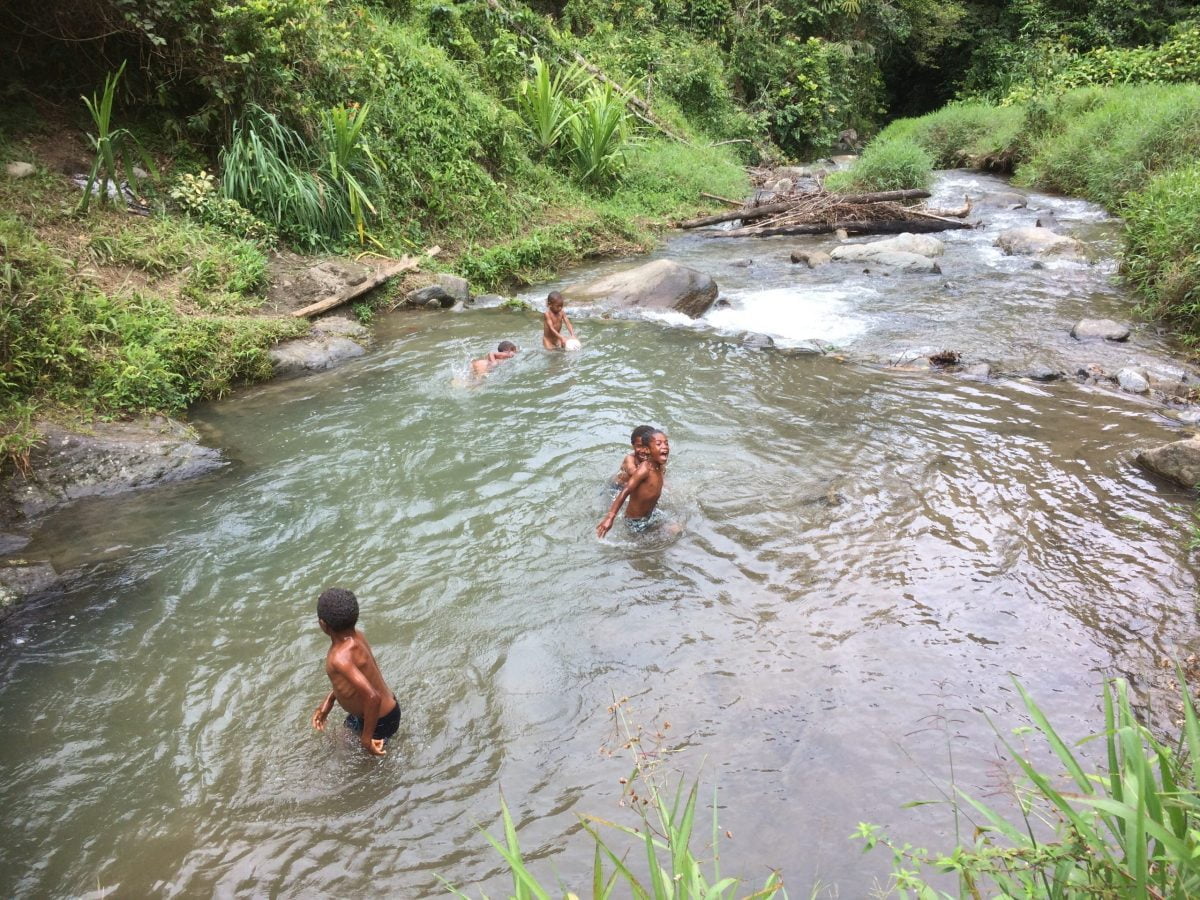
Accommodation
5 Nights Camping
2 Nights Hotel Stay

Transportation
Mostly on foot
Vehicle transfer from trail

Included Meals
18 Total Meals
Noted as (B, L, D)

Trip Grade
Category 3
High Heart Rate Holiday
Why we love this trip!
Learn the military history of the track from a passionate guide, understanding what both Australian and Japanese soldiers endured during the war. Walk the exact same path that the Australian and Japanese soldiers walked during WWII.
Feel the humidity, undertake the tough river crossings, understand how difficult the terrain is to cross. We walk through pristine rainforest, absorb stunning ridge views and make thrilling river crossings.
Get to know incredible locals, and learn about their culture as we walk with them, and sleep in their villages. You’ll attempt something that can push you to your physical and mental limits. We observe the Sabbath, which is a day of rest for our local team who are Seven Day Adventists. On this day, join them for a church service or simply enjoy a day to rest and recuperate.
Background
Until the track can be opened this is a great time to do your research on Kokoda and to plan your dream trekking adventure.
We are often asked the question when is the best time to trek Kokoda, and there is no easy answer for that as it depends on what your ‘why’ is for trekking Kokoda.
Anzac Day is an incredible time to be out on the track. If you have a personal connection to the Kokoda Track, if you want to feel a connection to our fallen soldiers and pay tribute to them, there is no better time. To end your trek with the Anzac Day Ceremony at Bomanna War Cemetery is an experience like no other.
May, June, September and October there are less crowds and the conditions may also be a little bit drier.
If you want to experience Kokoda with almost no other groups out on the track, trekking in February, March, November and December is a great option. Be warned it won’t be easy, as conditions are likely to be wet and slippery, but you will see a side of Kokoda very few have the privilege to experience.

These trips might
also interest you...
Orangutans in Borneo
Trekking Tongariro
Overview
Stage 1 - Nervous Excitement
You are filled with nervous energy as you board the flight to Popondetta and take the PMV to the start of the Kokoda Trail. Questions will race through your mind such as ‘will I be the slowest?’ or ‘have I trained enough to trek Kokoda?’. These are normal thoughts and questions, we would be more worried if you had no nerves or apprehension.
Stage 2 - This is Hard
In fact, the Kokoda Track is a real challenge and it is at times a struggle. There is sweat in your eyes, it has been raining and the entire track is a muddy slip and slide, you are sick of falling on your bum, you are also questioning why you are doing this.
Stage 3 - Gratitude Towards the Locals
In addition to finding your trekking legs, you will notice that the local team, modern-day ‘fuzzy wuzzy angels’, have stopped you from slipping over a dozen times a day. The local team has also set up your tent so that each afternoon when you arrive at camp everything is ready for you. Also, they have cooked your food and shared stories with you about their culture. They have lifted your spirits and you realise trekking Kokoda would be nearly impossible without them.
Stage 4 - Appreciation for What the Soldiers Endured
You have been transported to another time during your trek, where Australia was in danger of being invaded by the Imperial Japanese Army. You have heard the stories of individual soldiers and had a small glimpse of what conditions would have been like for them along the Kokoda Track.
Stage 5 - Elation and Self Pride
You cross the arches at Owers’ Corner and everything is worth it. The tough days and that one really freezing night is forgotten. You will hug your trek mates and marvel that you have trekked over 96km throughout a tough, unforgiving, yet stunning jungle. You have been up and down more hills than you could ever possibly count. In that moment you feel like you could achieve anything.
Note:
1/ This 9 day 8 night Kokoda trek is a demanding walk that requires an above-average level of fitness.
Itinerary
Arrive Port Moresby and transfer to hotel.
Pre-expedition briefing by your guide.
Note:
This Itinerary is indicative and may change due to local conditions.
Accommodation:
For those that do not wish to share accommodation in Port Moresby, a Single Supplement of $380 will apply.
Kokoda Expeditions:
No Roads Expeditions also has a dedicated Kokoda website. With over 100 pages of information, this is an invaluable source of information for those trekking the Kokoda Trail. Click on the kokodaexpeditions.com.au
Insurance:
It is mandatory for you to have appropriate insurance for this expedition. Click here to obtain an online quote.
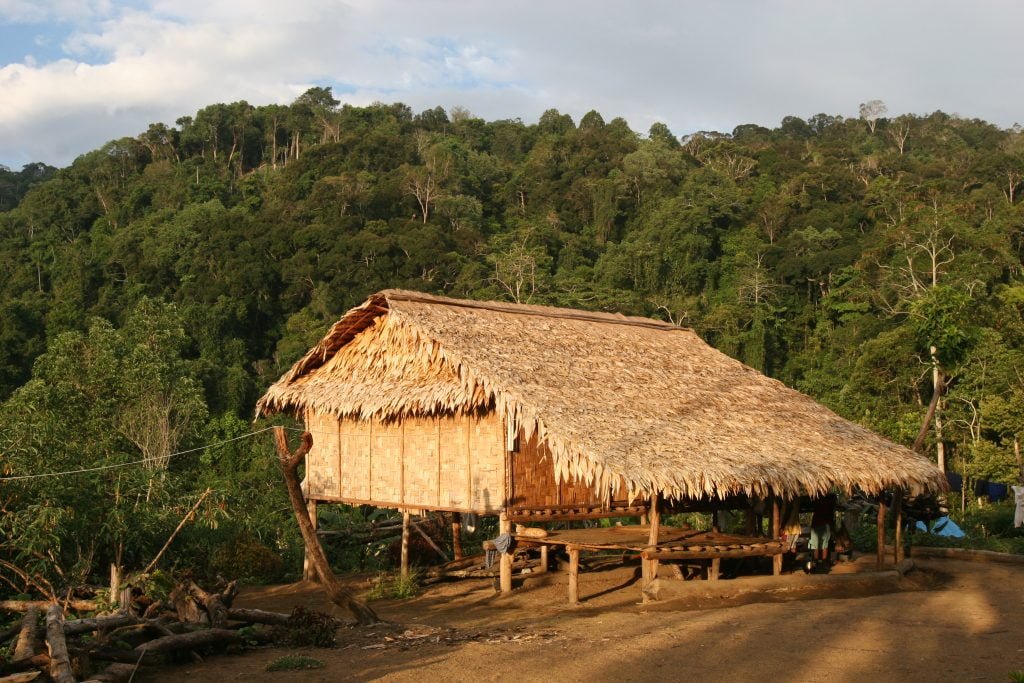
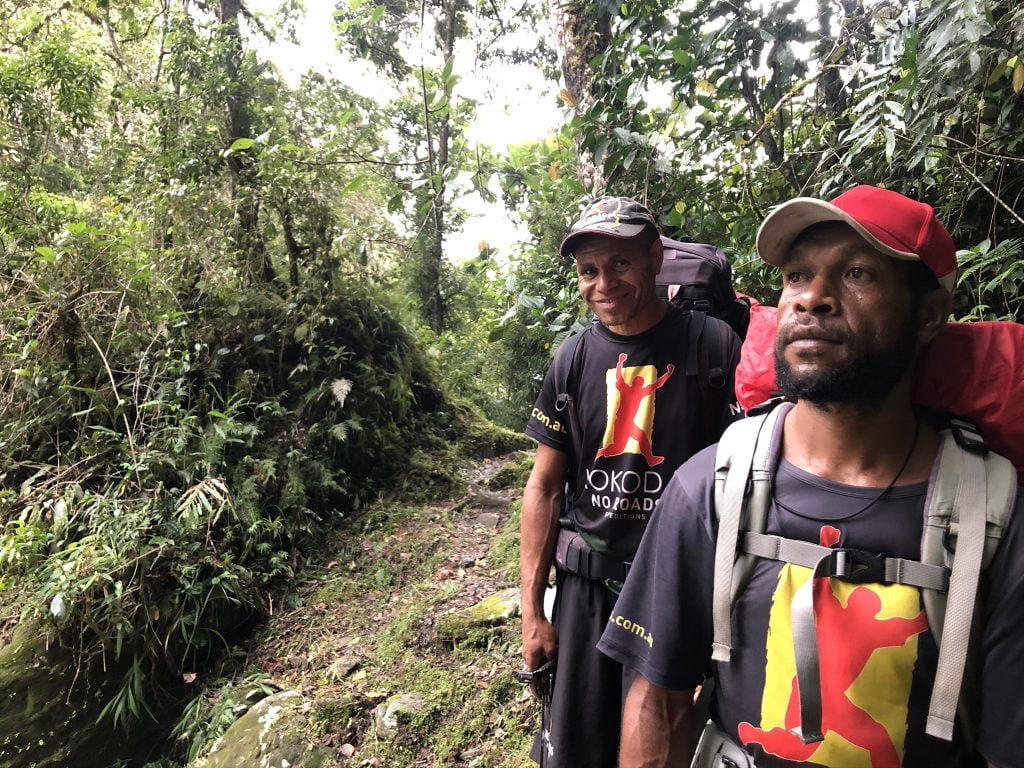
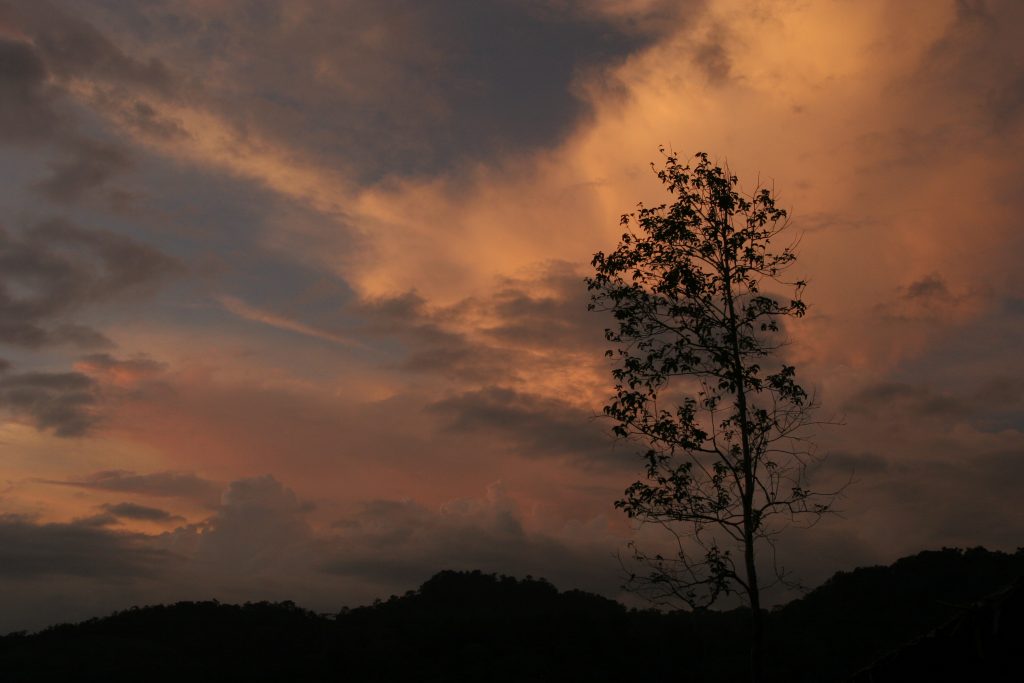
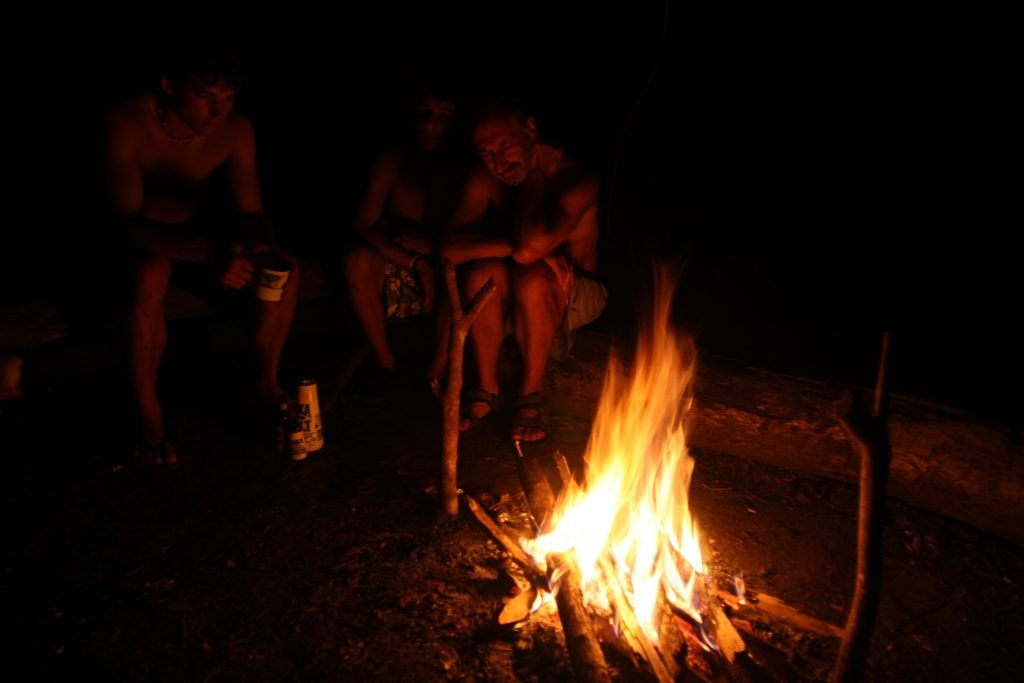
General Guides
The General Guides we use are the life blood of our business in PNG. Not only do they carry your food and equipment, but many have intimate knowledge of the areas we are traveling through. They are very interesting people who, at night, cook our meals and entertain us. If you or a group of you would like to hire a personal guide for your expedition, this can be arranged. For the 8 days, a personal guide costs an extra AUD$720.
Employing an extra guide does not mean that your struggle along the Kokoda track is any less meaningful. You are helping a local with a job and you will probably enjoy the Track that much more.
People of the Kokoda Track
The Koiari people generally inhabit the area between the foothills of the Owen Stanley Ranges east of Port Moresby and Kokoda. They once built homes in tree-tops and when Europeans first encountered them in the 1880’s, they were renowned for their fierceness.
Today, the Koiari are Seventh Day Adventists so they do not raise or eat pigs, chew betel nut or smoke tobacco. They grow taros, bananas, yams, vegetables and recently coffee. They are very friendly people, however young female Koiari are particularly shy and reserved and you should respect their wishes if they do not want to talk. Male bush walkers should give women the right of way on the trail – step off the trail, the further the better.
Also, be aware that men and women bathe in different places; usually the women down stream from the men. The same can apply to toilets, so ask first. Be sensitive, as this is of great importance to the people.
No Roads deals directly with the Koiari land owners. We have a great relationship with them and assured any Track closures will not apply to us.
Meals on the Kokoda Track
Our food is one of the biggest differences between us and other operators. We do not get you to carry the food and we do not supply baked beans and 2 minute noodles for every meal. We cook up curries, vegetarian pastas, damper, prawn crackers, fried rice and the list goes on. Our Master Chefs are specifically trained in food handling to ensure you have not only a delicious meal full of nutrition, but one that is safe to eat. You may even have the opportunity to help the Chef prepare the meal, giving you a chance to engage our local team in conversation and build a bond otherwise not obtained.
Another feature of this expedition is that we try to maximise the economic benefits from your presence to the village people living in villages along the Track. This provides incentives for villagers to offer a good standard of service to trekking parties as well as a vital source of income to pay for medicine, education and transportation.
As an ecotourism company we are always looking for ways to maximise the benefits of tourism to the people living in the local area. Our tour uses experienced guides recruited from all along the Kokoda Track, much of the food you will eat along the way is supplied by village people en route. This not only gives the villagers a market for their vegetable crops but gives you a wonderful opportunity to try out local foods. Food purchased locally includes pineapple, bananas, potatoes and pumpkins as well as eggs. Vegans and vegetarian trekkers are very well catered for and certainly will kept very well fed with delicious food.
Camp breakfast is billy tea/milo/coffee with damper and porridge or Weetbix and Corn Flakes with powdered milk. Occasionally we also have banana fritters. Camp lunch is noodles, pasta, cuppa soups, biscuits and cheese.
We also provide you with 9 days of electrolyte replacement such as Hydralyte, to replace fluids and essential electrolytes. This process helps prevent muscle seizures and cramps.
Finally, we provide you with 9 days of snacks that will help you from meal to meal. These consist of muesli bars, lollies, cuppa soups and trail mix.

The Kokoda track from start to finish is 94km long.
One No Roads trekker recorded over 25,000 steps on his pedometer in one day!
Inclusions
- Hand-selected and trained Australian and Local Guide for the entire expedition
- Electrolyte supplement such as Hydralyte, essential for such a trip
- All domestic scheduled flights within PNG
- Satellite phone for emergency purposes
- AED Defibrillator on all Australian Led trip
- River rescue team and procedures, essential for large rivers
- Government Taxes (except visa charge and civil aviation terminal facilities charge)
- Shower tent to wash with soap and protect the environment. Hot showers are available.
- 10 delicious breakfasts, 9 nutritious lunches, 9 fresh dinners. Meals on expedition include Curries and Pasta.
All prepared by a trained MasterChef. (Dietary requirements such as vegetarians/vegans/gluten intolerant can be incorporated) - All transfers including those from the airport and from Owers Corner
- Visit Bomana War Cemetery
- Nutritious and delicious food for our local guide team who deserve the best.
- All accommodation outside of Port Moresby in either insect-proof tents or guest houses
- Kokoda Track Permit
- Hand-selected Guide and local team (who carry all group equipment, food, set up tents etc)
- 1 to 1 General Guide-Client ratio
- A rubbish Guide that takes all our rubbish and other operators rubbish from the Track
- Tent hire and floor mats.
- 2 nights accommodation in Port Moresby twin share (4 star Holiday Inn)
- Dinner on the last night at the hotel
- Snack Pack for each expedition day to get you between meals
- VHF Radio contact with Port Moresby, Kokoda and 10 other Track villages for emergency purposes.
- No Roads Expedition T-shirt
- Urine and health chart
- Access to your Australian Guide for advice prior to the expedition
- Access to FREE weekend walks before and after the expedition
Exclusions
- International Flights
- Travel Insurance
- Personal spending money
- Tips for General Guides
- Any meals not listed as included
